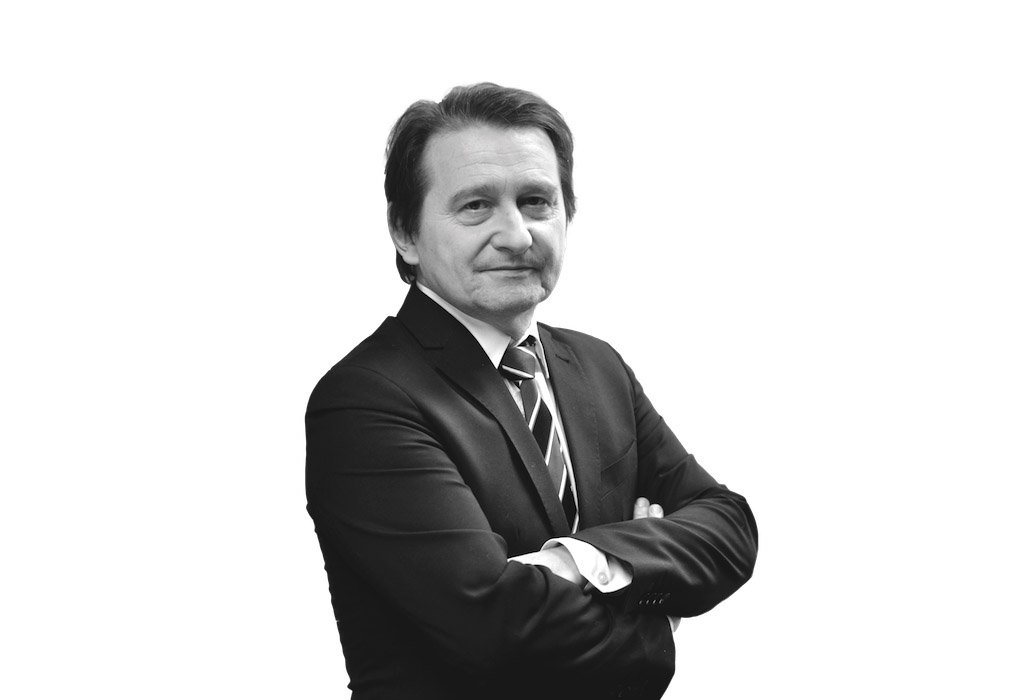By: Jože Biščak
Scenes from Kremlin have (been) grotesque lately. Putin is sitting at a white table on the edge of an infinitely large hall. At the other end, there are advisors on chairs. Clearly, if they want to hear each other, they must scream. It is similar when he accepts foreign leaders. Long and narrow conference table. He at one end, the guest at the other, in between there is nothing for ten metres. This was done by tsars. And Putin wants to become the new Russian tsar with Bolshevik methods. Even outwardly this must be seen, the counsellors or the guest must feel and be aware of who can touch the sky. And he seems to have already reached the level of a tyrant when physical contact between people becomes impossible, and he uses appropriate spatial distance because he is afraid of Brutus from his own kind.
Vladimir Putin is not a blessing to Russia; he can only be a curse; like all former employees of the socialist secret services (these were in fact political police aimed at neutralising ideological opponents) who rose to the positions of heads of state. When the morbidly ambitious Leningrad KGB apparatchik moved to Moscow in 1996, he wasted no time. With the help of the old communist nomenclature, he became head of the FSB (successor to the KGB) in 1998. In August 1999, he was appointed acting Prime Minister, and was elected for his first presidential term less than four months later. Through political and legislative manoeuvres (leaps from Prime Minister to President and back), the removal of all those who disagree with him, the persecution of the opposition and the amendment of the Constitution (2021), his rule can be extended until 2036, when he will 84 years old.
It is similar in quite a few former Soviet republics, where tyrants rule with a hard hand with families and their friends. As a rule, they are Putin’s allies, supporting his expansionist aspirations to rebuild the Cold War-era Soviet state and control Eastern European countries. And we all know that the latter was controlled by force by the Soviet Union. Putin certainly remembers how the “friendly” Red Army invaded Hungary in 1956 and ravaged Budapest, how the Soviets separated West and East Germany from the Berlin Wall in 1961, and how they invaded Czechoslovakia in 1968. The excuse has always been similar, if not the same: to “help” countries where reactionaries and Nazis are raising their heads with the help of the imperialist West.
We listen to Putin’s vocabulary in Slovenia with horror
Even today, the Kremlin claims it wants to end Nazism in Ukraine. This is a completely Bolshevik vocabulary, which we can also listen to with horror in Slovenia, when the left-wing opposition with the media mainstream claims that the centre-right government is fascist, Nazi. And this is being said by the same people who sympathise with Putin and are also friendly with the regime in Moscow. The same people who reject the possibility of Slovenia temporarily accepting Ukrainians fleeing Russian tanks. In contrast to people from the Middle East and Africa who leave their wives and children at home and seek entertainment and spread Islam in Europe through social tourism, Ukraine has real refugees: helpless women and children while men stay, to defend their homeland.
Thirty years ago, Ukraine consciously renounced nuclear weapons (they had the third largest nuclear arsenal in the world) because it was counting on EU and NATO membership. But its entry was blocked mainly by Germany, which gave in to Putin over the Nord Stream 1 and 2 pipelines. How right is Janša when he says: “If the EU will not expand, someone else will.” Thus, the world has now found itself on the brink of global conflict.
Putin is by no means a great statesman and leader, he is only a madman, dizzy from the heights of the lukewarm warnings of the West. Of course, we could close our eyes, throw everything over our shoulders and hope that Russia only wants Ukraine. But all indications are that the madman from the end of the conference table raised his stake and started playing a game from which he can (almost) no longer withdraw. So far, he has managed only two things in this dangerous game: that he has deterred most of the world from him and that the Russian army is not so powerful, as even the fifth generation of overpowering fighters cannot provide complete control of the skies.
Jože Biščak is the editor-in-chief of the conservative magazine Demokracija, president of the Slovenian Association of Patriotic Journalists and author of the books Zgodbe iz Kavarne Hayek, Zapisi konservativnega liberalca in Potovati z Orwellom.

